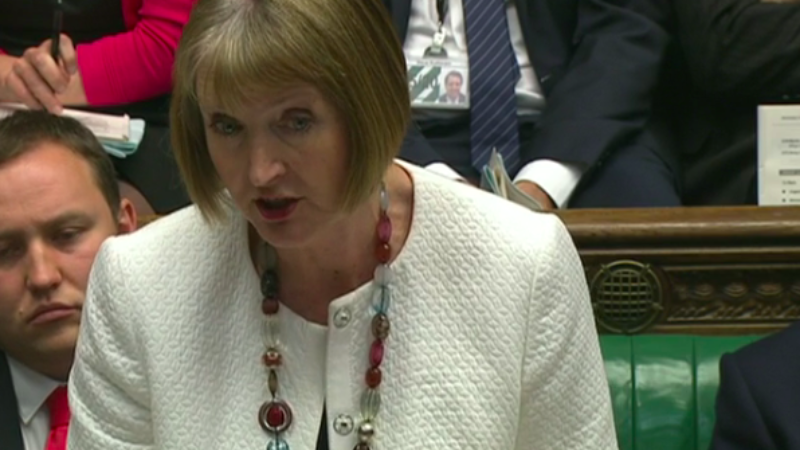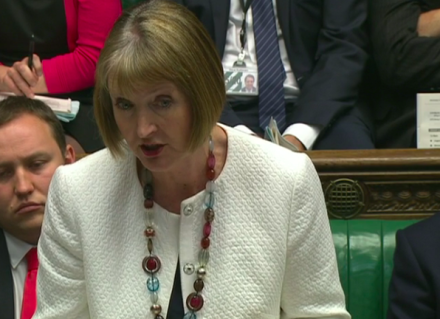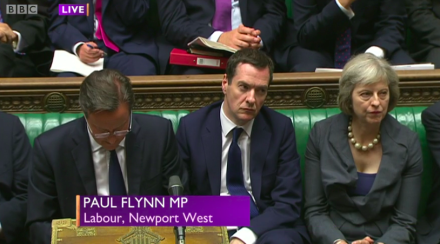
“Come over here!” shouted the Conservative MPs, waving their arms in a beckoning fashion as Harriet Harman stood up to address the House. They were gleefully mocking the accusations of being a Tory that the acting Labour leader has faced this week, since suggesting the party may not oppose all of the welfare bill earlier this. The humour for them, of course, comes from the fact that Harriet Harman, a politician they have long derided as a beacon of the ridiculous left, coming under fire for her secret right wing agenda.

It’s not hard to see how this PMQs could have gone very badly for Harman. Certainly, faced with a fourth day of party splits over an issue like welfare, it almost certainly would have done for Miliband, who was often a shaky performer even when things were going his way.
But Harman, who has consistently managed strong performances at the weekly exchanges, held her own again.
She split her questions three ways. Firstly, she questioned Cameron on the sustainability of the Eurozone’s Greece deal, which seemed to bounce the PM into a pledge on no UK money going towards bailouts – something he probably would have rather kept as an ambition.
Then, she moved brazenly onto welfare, knowing that to avoid it would only make matters worse. She took Cameron to task both on his cuts to tax credits, and the reduction of support allowances for ill claimants – which is surely among the most unnecessary policies of Osborne’s Budget. While the Tory leader tried to open up the divisions Labour are suffering from with his reply, Harman’s attacks on the subject took out the sting.
Obviously, the session could not go without a mention of the Conservatives’ newly unveiled anti-union laws, which went about as predictably as you would expect. However, Cameron’s supposedly killer line (“People affected by strikes don’t get to vote”) was surprisingly weak. Unless he makes clearer want unfairness in the system he is trying to stamp out, he may struggle to sell these reforms more than he thinks.
We also got to see a joy of backbench questioning today.
William Hague recently revealed a PMQs technique he developed as Leader of the Opposition. Tony Blair had a great big ledger that would be filled with facts on any subject he might be questioned on, making him a formidable opponent.
To get around this, Hague started to structure his questions so that the subject was only revealed on the last word, leaving Blair unable to find the topic in his book quickly enough to devise a smart answer.
With Cameron taking a similar approach to PMQs as Blair, that particular style of questioning can still prove fruitful. Veteran MP Paul Flynn today delivered a classic of the genre.
“Cardiff has 600,” he began. Cameron looked up, ledger open, waiting. “Newport has 400. Rochdale has 700.” By this point, Cameron began flicking through his book, presumably with a vague hope of landing on the correlating statistics by sheer luck.

“Yet the constituencies of the Prime Minister, the Chancellor, and the Home Secretary have a grand total of only three.” On television, the camera cut back to Cameron here, providing a split second capture of his moment of panic. “Is this a fair, and efficient way… to locate asylum seekers?” Flynn concluded.
Defeated, Cameron stood up, said he thought the distribution of asylum seekers had been the same for a long time, and that he’d take a look at it, before sitting straight back down, somewhat sheepishly. It may not be the most effective way of holding the Government to account, but it doesn’t mean it’s not worth it.




More from LabourList
‘Labour must confront the crisis of first past the post before it’s too late’
Unite to debate affiliation with Labour Party at conference next year
Miliband tops LabourList Cabinet league table, with gender divide in PM approval